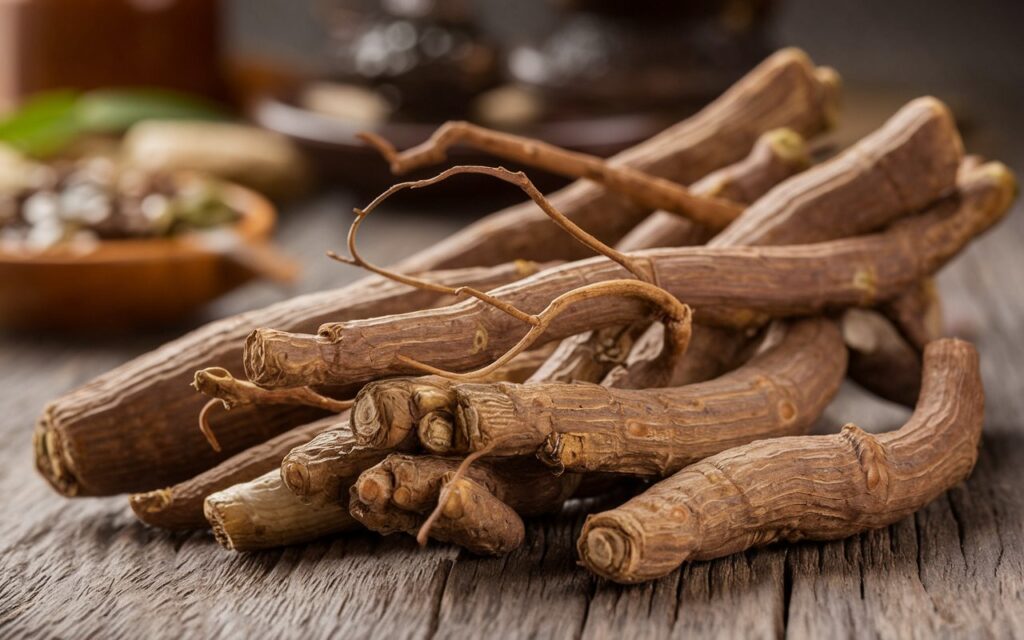Ashwagandha, scientifically known as Withania somnifera, is a revered herb in Ayurvedic medicine. Often called Winter Cherry or Indian Ginseng, this adaptogenic herb is a go-to remedy for various health issues. Whether you’re looking to support your immune system, combat stress, or enhance physical performance, Ashwagandha offers a multitude of benefits.
Identifying Ashwagandha
Native to India, Ashwagandha thrives in warm climates without frost. You can also grow it in herb gardens across the United States. The plant prefers sandy or rocky soil and full or partial sunlight. It grows to a height of 2 to 3 feet and features dull green leaves with light green, bell-shaped flowers that appear in midsummer. In the fall, the plant produces orange to red berries. For more tips on growing herbs, check out our Herb Gardening Guide.
Edible and Other Uses
Although Ashwagandha isn’t typically consumed as food, you can use its seeds to produce vegetarian cheeses, and the leaves are commonly brewed into Ashwagandha tea.
- Soap Substitute: The fruits are rich in saponins, making them a natural alternative to soap.
- Insect Repellent: The plant’s leaves repel insects.
Medicinal Benefits of Ashwagandha
For thousands of years, Ashwagandha has been a cornerstone of herbal medicine. Its adaptogenic properties help the body adapt to stress, offering both physical and mental health benefits.
Adrenal Fatigue and Stress Management
Ashwagandha supports adrenal function and helps balance the hypothalamic-pituitary-adrenal (HPA) axis, a key component of our stress response system. This makes it effective for treating symptoms of adrenal fatigue and HPA axis dysregulation (HPA-D). Learn more about how adaptogens can support adrenal health in our article on Natural Remedies for Adrenal Fatigue.
Anxiety and Depression
The herb relieves anxiety, stabilizes mood, and improves mental health. Unlike conventional medications, it doesn’t cause drowsiness or other side effects. Explore additional natural treatments in our guide on Herbal Remedies for Anxiety and Depression.
Cortisol Reduction and Blood Glucose Regulation
- Reduces Cortisol Levels: High cortisol levels, associated with stress, can lead to weight gain, especially in the abdominal area. Ashwagandha helps reduce cortisol levels in chronically stressed adults. For more on managing stress naturally, visit our Stress Relief Techniques article.
- Balances Blood Glucose Levels: Particularly beneficial for diabetic patients, Ashwagandha can help reduce blood glucose levels and improve insulin sensitivity. Discover more in our post on Herbal Remedies for Blood Sugar Control.
Cancer Treatment and Immune Support
Research shows that Ashwagandha has anti-tumor effects, particularly in treating breast, lung, stomach, ovarian, and colon cancer. It not only reduces tumor growth but also boosts immunity and helps patients cope with the side effects of conventional cancer treatments. Learn about other cancer-fighting herbs in our article on Herbal Cancer Remedies.
Memory and Brain Health
The herb protects the brain from degeneration and oxidative stress, potentially aiding in the treatment of neurodegenerative diseases like Alzheimer’s and Parkinson’s. For more on brain health, check out our guide on Herbal Remedies for Cognitive Function.
Physical Performance and Joint Health
Ashwagandha offers numerous benefits for physical performance and joint health.
- Stamina and Endurance: Ashwagandha boosts physical performance, reduces muscle pain, and enhances endurance, making it a popular supplement among athletes. Explore other performance-enhancing herbs in our post on Natural Ways to Improve Athletic Performance.
- Joint Health: Those suffering from rheumatoid arthritis experience improved joint function and reduced pain after taking Ashwagandha for eight weeks or longer. Find more natural remedies in our article on Herbal Solutions for Joint Pain.
Sexual Function and Fertility
Ashwagandha enhances sexual function in both men and women by boosting testosterone levels, improving fertility, and enhancing sexual satisfaction. For more on natural fertility boosters, visit our Herbal Fertility Guide.
Harvesting Ashwagandha
Harvesting this powerful herb is straightforward. Pick the berries in the fall when they are red and fully ripe, then dry them for planting in the spring. For medicinal use, dig up the roots in the fall, clean them thoroughly, slice, dry, and powder them for future use. Use the leaves fresh or dried for tea. For more tips on harvesting herbs, check out our Herb Harvesting Guide.
Safety and Precautions
Although Ashwagandha is generally considered safe, consult a healthcare provider before long-term use, especially if you have underlying health conditions. For more information on herbal safety, visit our Herbal Safety Tips page.
Conclusion
Ashwagandha is a powerhouse herb that offers a wide range of benefits, from reducing stress to boosting physical performance. Whether you’re incorporating it into your daily routine or using it to address specific health concerns, this versatile herb can significantly improve your well-being. For more herbal wisdom, explore our other articles on Lost Herbal.
